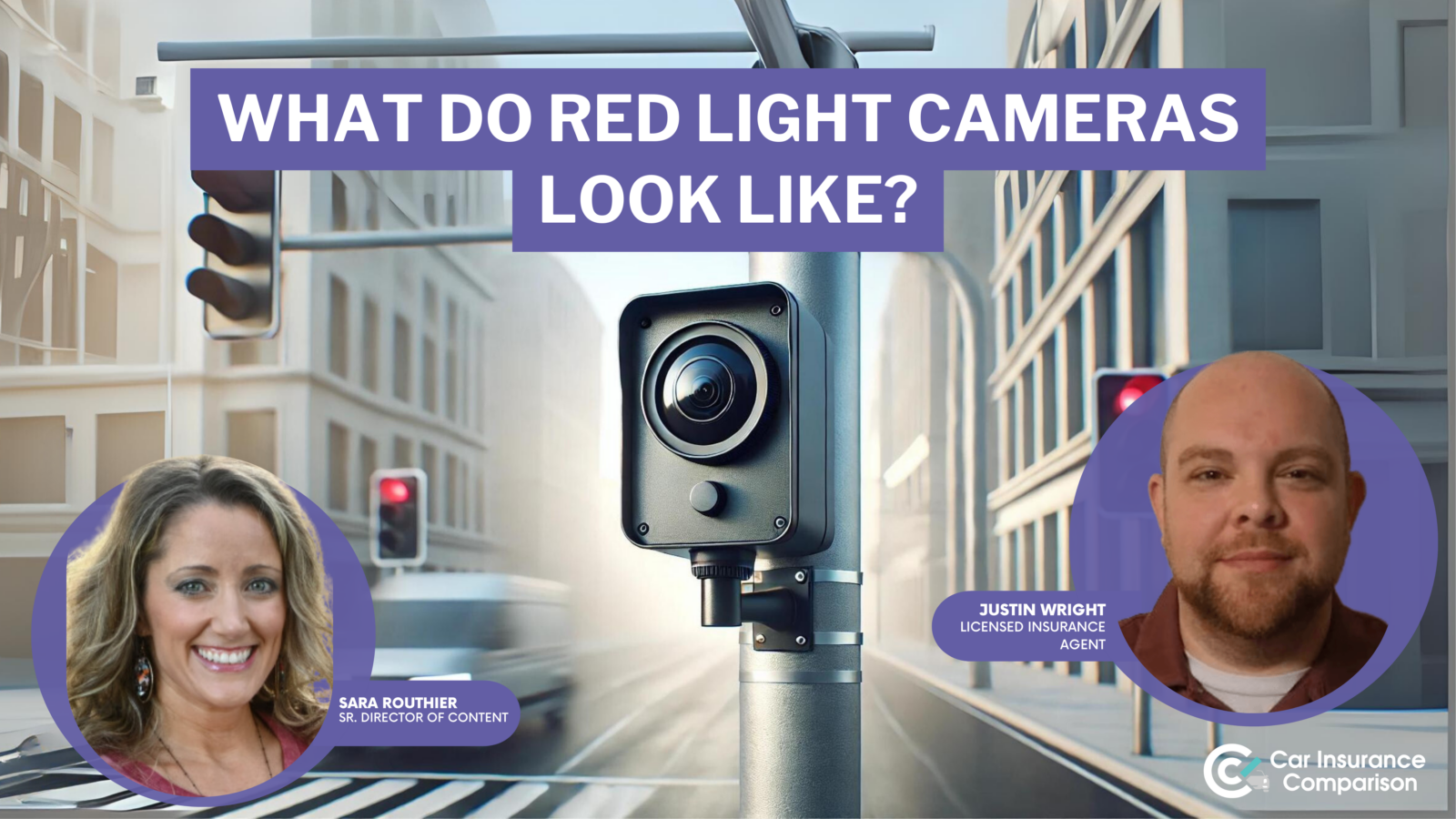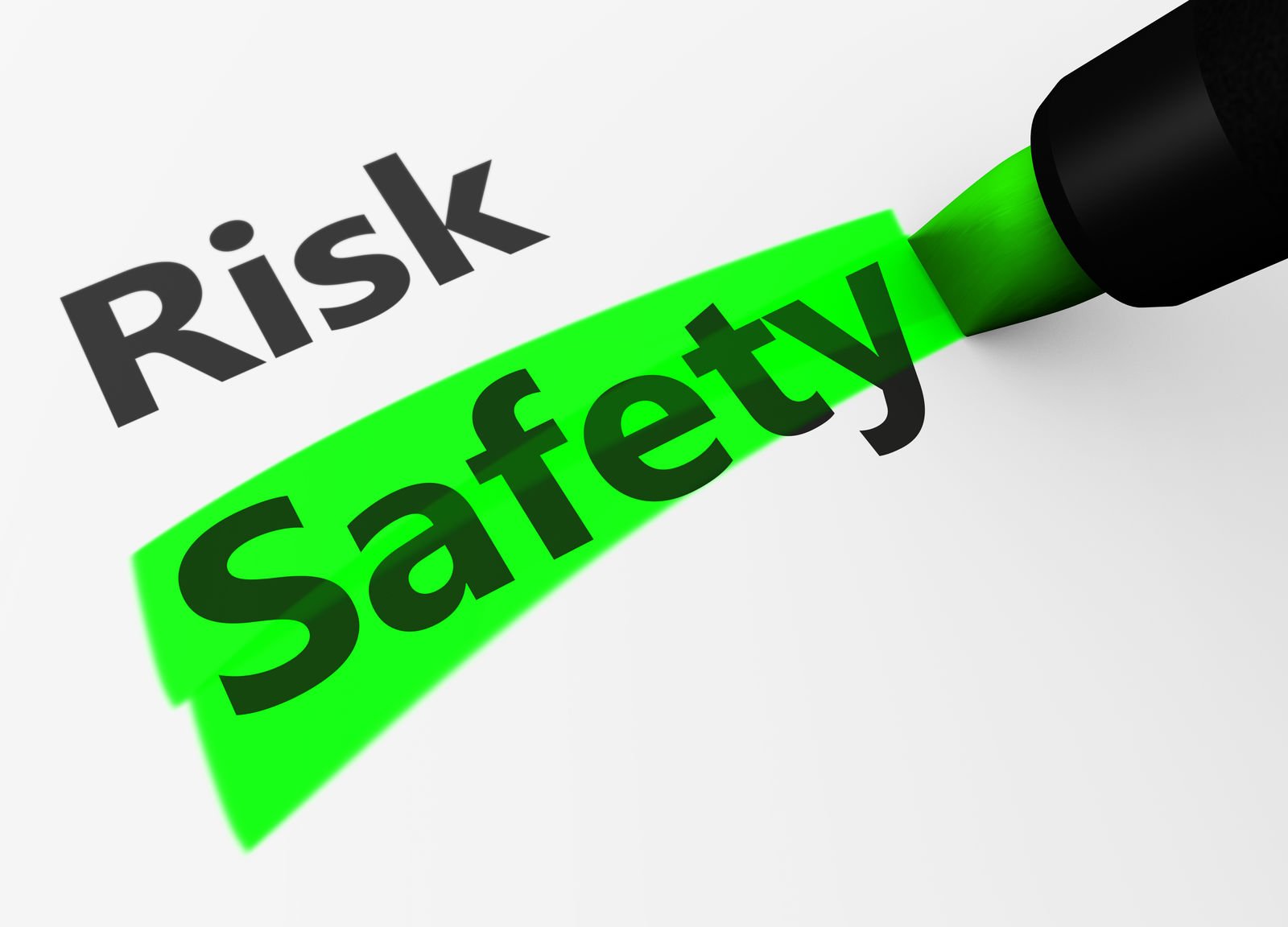What do red light cameras look like?
What do red light cameras look like? They tend to look bulkier than other traffic cameras and are most often placed on tall metal poles near intersections. Twenty-two states and the District of Columbia have red light cameras, while seven other states ban their use. In general, busier intersections are more likely to have red light cameras. If you’re ticketed by a red light camera, pay or contest the ticket as soon as you can.
Read more Secured with SHA-256 Encryption





Table of Contents
Table of Contents


Sr. Director of Content
Sara Routhier, Managing Editor and Outreach Director, has professional experience as an educator, SEO specialist, and content marketer. She has over five years of experience in the insurance industry. As a researcher, data nerd, writer, and editor she strives to curate educational, enlightening articles that provide you with the must-know facts and best-kept secrets within the overwhelming world o...
Sara Routhier


Licensed Insurance Agent
Justin Wright has been a licensed insurance broker for over 9 years. After graduating from Southeastern Seminary with a Masters in Philosophy, Justin started his career as a professor, teaching Philosophy and Ethics. Later, Justin obtained both his Property & Casualty license and his Life and Health license and began working for State Farm and Allstate. In 2020, Justin began working as an i...
Justin Wright
Updated November 2024
About half of U.S. states have red light cameras on the road. Whether you run a red light because of an emergency or mistakenly make a prohibited right turn on a red, knowing what red light cameras look like can help you prepare for the possibility of a ticket.

To help you protect your driving record so insurance companies don’t start viewing you as a high-risk driver, we’re here to answer some common questions about red light cameras. Read on to find out where red light cameras are located, what states use them, how you can tell if one caught you running a red light, and how long you should expect to wait before receiving a ticket.
Once you have a better idea of how red light cameras look and work, enter your ZIP code in our free online tool to compare car insurance rates and find affordable coverage in your area.
- Red light cameras are bulky and have a box-like shape
- Red light cameras are most often positioned on tall metal poles near intersections
- Signs are sometimes posted to inform drivers of red light cameras and the penalties for running a red light, but this isn’t always the case
What does a red light camera look like?
Red light cameras are often mistaken for traffic cameras. Traffic cameras, which are intended to monitor the flow of traffic, are smaller and look like most other surveillance cameras. Since red light cameras are intended to record drivers and their license plates, they’re bulkier and have more of a box-like shape.
It’s worth noting that red light cameras aren’t constantly recording the road. Instead, they’re connected to monitors on the road that detect cars that pass by and trigger the camera. A red light camera usually takes two photos when triggered, and these are what you’ll see if you’re given a ticket for running a monitored red light.
Read more: 10 Facts You Should Know about Traffic Cameras
Where are red light cameras located?
Red light cameras are most often positioned on metal poles near intersections, usually about ten or fifteen feet off the ground. While there’s no guarantee that any particular red light will or won’t have a camera, you can expect that busier intersections are more likely to have cameras simply because they see more traffic.
In some cases, signs will be posted near or on traffic lights to inform drivers that there is a red light camera nearby that will record them if they run a red light. That said, these are not required in all states, so don’t expect the absence of a sign to always indicate the absence of a camera.
HOW IT WORKS: Red Light Cameras
Here’s what you should look out for when checking for a red light camera:
- First, look out for any signs on the side of the road or above intersections informing drivers of a red light camera
- If you don’t see any signs, check the sides of the road to see if there are any tall metal poles that a camera could be attached to
- Finally, look around for any cameras with a box-like shape closer to the ground or attached to the traffic light itself
What states have red light cameras?
According to the National Conference of State Legislatures, 22 states in the United States have red light cameras in at least one city. The District of Columbia also has red light cameras. Red light camera locations are found in: Alabama, Arizona, California, Colorado, Delaware, Florida, Georgia, Illinois, Iowa, Louisiana, Maryland, Missouri, New York, North Carolina, Ohio, Oregon, Pennsylvania, Rhode Island, Tennessee, Texas, Virginia, and Washington.
While most states without red light cameras don’t explicitly prohibit them, Maine, Mississippi, Montana, New Hampshire, South Carolina, South Dakota, and West Virginia have passed laws that prevent local governments from installing red light cameras on roadways.
What do red light cameras look like in Florida? What do red light cameras look like in California? Red light cameras look more or less the same in every state.
Texas occupies a unique position when it comes to red light cameras. Although a 2019 bill bans red light cameras in the state, certain communities in the state will continue using them until their current contracts expire.
Free Insurance Comparison
Compare Quotes From Top Companies and Save
Secured with SHA-256 Encryption
How can you tell if a red light camera took your picture?
If you run a red light in an area where a red light camera is present, you may see a flash. This flash indicates that the camera has taken one or two photos of your car. A red light camera will always attempt to photograph your car’s license plate. And, depending on your state, the red light camera may take a picture of the driver’s face as well (some states prohibit this).
When a red light camera takes a picture of a vehicle, the image is sent to a police computer database along with other relevant information like the time, date, and location. After a law enforcement official reviews a photograph from a red light camera, they’ll decide if sending the driver a ticket is appropriate.
How long does it take to receive a ticket from a red light camera?
The exact amount of time you can expect to wait for a red light ticket depends on your city and state, but it’s not uncommon for tickets to arrive within two weeks to one month following the infraction. If it’s been more than a month and you haven’t received a ticket or courtesy notice in the mail, it’s very unlikely that you will be ticketed.
If you do receive a ticket in the mail, pay the fine or contest the ticket in court as soon as possible. You may even be able to have the ticket dismissed entirely by hiring a skilled traffic ticket lawyer who can make your case for you — and help you maintain a good driving record.
Depending on your city or state, you may also have to look out for misleading notices that seem to function like real tickets but actually don’t. They may say something like “Courtesy Notice: This Is Not A Ticket” and ask for information on the driver of the vehicle recorded by a red light camera. Drivers are not obligated to reply to these notices.
What happens if you run a red light with no camera?
Unless police cars are present to catch you running a red light, you won’t receive a ticket for running a red light without a camera. Of course, doing so is still illegal and dangerous — with the potential to result in damages far more costly than a traffic ticket.
Save for emergency situations, drivers should never run red lights, even if it’s unlikely that their actions will be recorded by a red light camera.
What to Remember About Red Light Cameras
- Red light cameras have a bulky, box-like shape and are most often positioned on poles near intersections.
- 22 states and the District of Columbia have red light cameras, while seven states currently prohibit them.
- It typically takes two weeks to one month to receive a ticket from a red light camera. Pay or contest tickets as soon as possible to avoid additional fees and/or penalties.
A large part of the risk in getting a red light ticket comes from how getting too many can increase your insurance rates. Use our free online tool to compare rates and find affordable coverage options in your area.
Case Studies: Red Light Camera Incidents
Case Study 1: Unexpected Flash
Sarah was driving through a busy intersection when she noticed a sudden flash of light. Unbeknownst to her, it was a red light camera capturing her running a red light. A few weeks later, she received a ticket in the mail with the photographic evidence.
Sarah decided to contest the ticket, claiming that the intersection’s traffic signal was malfunctioning. With her detailed explanation and supporting evidence, Sarah was successful in getting the ticket dismissed.
Case Study 2: High-Traffic Intersection
Michael frequently drove through an intersection known for its heavy traffic. One day, while waiting at the intersection, he noticed the presence of a red light camera on a metal pole. The sight of the camera made him more cautious, ensuring he always obeyed traffic signals. This extra vigilance paid off as he avoided any violations and potential tickets from the red light camera.
Case Study 3: Delayed Ticket
David accidentally ran a red light at an intersection with a red light camera. Weeks passed, and he didn’t receive any ticket in the mail. Thinking he had escaped the consequences, he was surprised when a ticket arrived two months later. David decided to pay the fine promptly to avoid any further complications and learned the importance of being aware that tickets can sometimes be issued after a significant delay.

Frequently Asked Questions
What do red light cameras look like?
Red light cameras are bulkier than other traffic cameras and are usually placed on tall metal poles near intersections. They have a box-like shape and are designed to capture photos of drivers and their license plates when triggered.
Where are red light cameras located?
Red light cameras are commonly positioned on metal poles near intersections, about ten or fifteen feet above the ground. While there’s no guarantee that any specific intersection will have a camera, busier intersections are more likely to have red light cameras due to higher traffic volume.
What states have red light cameras?
According to the National Conference of State Legislatures, 22 states in the United States have red light cameras. These states include Alabama, Arizona, California, Colorado, Delaware, Florida, Georgia, Illinois, Iowa, Louisiana, Maryland, Missouri, New York, North Carolina, Ohio, Oregon, Pennsylvania, Rhode Island, Tennessee, Texas, Virginia, and Washington. The District of Columbia also has red light cameras.
How can you tell if a red light camera took your picture?
If a red light camera captures your vehicle running a red light, you may see a flash. The camera takes one or two photos of your car, including the license plate. Depending on the state, it may also capture the driver’s face. The images are then sent to a police computer database for review.
How long does it take to receive a ticket from a red light camera?
The time it takes to receive a ticket from a red light camera can vary depending on your city and state. Typically, you can expect to receive the ticket within two weeks to one month after the violation. If you haven’t received a ticket or courtesy notice after a month, it’s unlikely that you will be ticketed. It’s important to pay the fine or contest the ticket as soon as possible if you do receive one.
Get a FREE Quote in Minutes
Insurance rates change constantly — we help you stay ahead by making it easy to compare top options and save.







